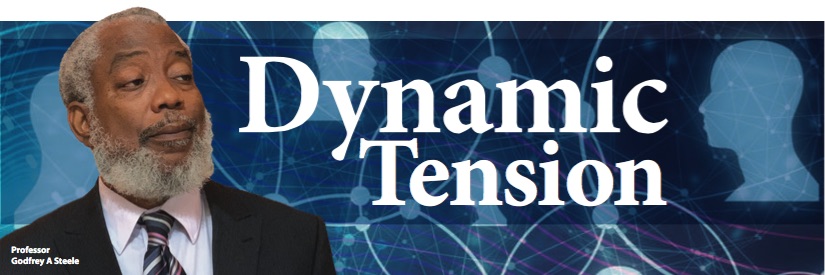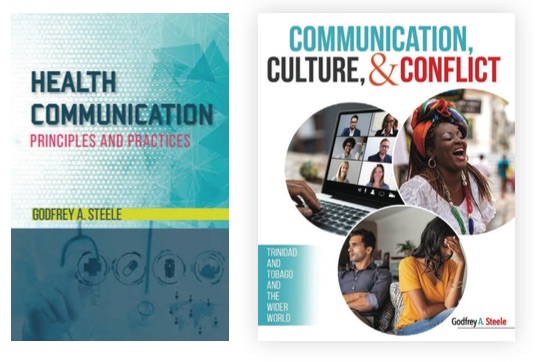
The study of Human Communication presents both opposing and complementary themes, identities, and processes.
In his Inaugural Professorial Lecture entitled “Human Communication Studies: What, Why, and How from a Caribbean Perspective”, Godfrey A Steele, Professor of Human Communication Studies at UWI St Augustine, sought to explore this idea with his virtual audience on January 27, 2022.
Referencing several studies, Professor Steele defined human communication as “the study of the creation, exchange, and sharing of messages and meaning in human interactions”. The Human Communication discipline spans 49 sub-specialties some of which are now available for study at UWI St Augustine growing from four, of the possible two dozen, offered in 1999.
Human Communication courses and programmes were first established at UWI St Augustine in 1992. These were different from the programmes established at what he described as The UWI Mona School of Communication in their philosophical orientation and curriculum scope and design. Both programmes would go on to contribute to the Caribbean and global identity of communication studies, bridge the gap in Caribbean literature, and provide representation for Caribbean scholarship in the world literature on the subject.
Comparing Human Communication Studies to classical music, Professor Steele acknowledged that the local community has not yet accomplished what Mozart achieved. However, he said, “We are at a point that allows us to consider what has been accomplished, and how it might provide the creative momentum for our human communication field in the Caribbean to contribute to global scholarship.”
Having had seven tracks of human communication identified by the Association for Human Communication Studies in the Caribbean (AHCSC) at its second biennial conference in 2015, Professor Steele noted, “[W]e are beginning to make a modest contribution.”
Making his own contributions, Professor Steele has authored several books, book chapters, journal articles, conference papers, and teaching booklets and manuals. In these works, the theme of dynamic tension in telling the human communication story echoes the nature of Human Communication Studies itself.
Unfortunately, as Professor Steele pointed out, there is still some underlying tension within the discipline as it struggles with new dichotomies of where it should be philosophically located. Reminding his audience that the question, “Is it a humanities or social science discipline?” was long-settled, Steele pointed to newer questions relating to the discipline’s identity in the Anglophone Caribbean.

However, he also notes that there are more similarities than differences between these disciplines and other scientific disciplines. Reflecting on his career, which includes research, teaching and service in communication studies, human communication and health communication, Human Communication Studies is no stranger to combining ideas, often competing ones.
In this vein, he noted, “Trying to explore how Human Communication Studies is defined and developed can be challenging and even perplexing to the uninitiated. Theoretical opportunities for transdisciplinary and interdisciplinary collaboration are well documented, but the challenges of actual implementation are of equal, if not more, interest.”
Human Communication Studies continues to grow and expand. The programmes within it have since branched out to create other such programmes in various disciplines.
This is reflected in the views of the discipline endorsed by Professor Steele, particularly numbers 2 and 3: (1) communication can have a transformative impact on the social sciences; (2) the historical opposition between social sciences and humanities needs to be disrupted to allow for integration; and (3) interfaces between the humanities and social sciences could be mutually stimulating for both disciplines, as well as for the humanities and medical sciences.
In the past 30 years, Professor Steele has been integral to the introduction of various projects that have contributed to identification and development of communication study, teaching, and research, as well as the outreach needed.
Partnerships with institutions like the International Association for Business Communicators (IABC) Trinidad and Tobago Chapter, the formation of bodies such as the Communication Studies Association (CSA) in 2005, and establishment of the Community Research Day (2007) at UWI St Augustine, just to name a few, are representations of the attempts to address the responsibility of and to Human Communication Studies in several forms.
Relatedly, Professor Steele brought attention to the fact that the triad of research, teaching and knowledge transfer to wider social partners in government, entrepreneurship, and non-governmental organisations is becoming more established.
In his lecture, Professor Steele emphasised that his early life – from his mother’s attentions to the contributions of his teachers in primary and Sunday School, all the way up to higher education – shaped him greatly and steered him through his later years.
Now a teacher himself, of his students he says, “I am very proud of them. They too are contributing to what we are doing, and this is part of the way [forward], because our eyes are on the future, and they will take us forward.”
Closing with a comparison of the Caribbean perspective then and now on the subject, he cited his most recent book, Communication, Culture and Conflict (2021), as well as the ongoing project the Human Communication Scholarship Database, Book and Documentary Film (2019-2022) as centralised hubs of information on Human Communication Studies within the Caribbean. For more on these, check out the article in our December issue at https://sta.uwi.edu/uwitoday/article6.asp.
He stated, “The human communication tradition and legacy, which began in business communication (1992) and from health communication (1995), communication studies (1999) and human communication studies (2009) to now, is a reputable brand that we have nurtured and built that deserves to be sustained and resourced.” One possible way of doing so is through the formal establishment of a UWI St Augustine School of Communication and Media, he suggested.
Human Communication Studies is an amalgamation of many things, but probably most notably, it seeks to understand how people create, exchange and share messages and meaning in every context and how the study of human communication relates to our own humanity and as Steele noted, its work is far from finished.
To view Professor Steele’s lecture, visit The UWI St Augustine YouTube page at https://youtu.be/N0Tksimo5DY.